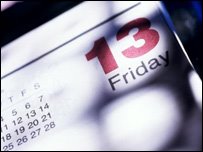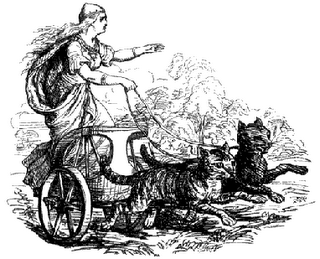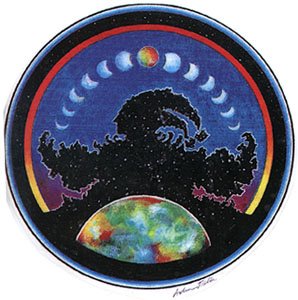
Well according to Christian history Friday was just not a good day.
Of course there is Good Friday when Christ was crucified.
Adam and Eve also supposedly ate the forbidden fruit on a Friday,
the Great Flood started on a Friday,
the builders of the Tower of Babel were tongue-tied on a Friday
and the Temple of Solomon was destroyed on a Friday.
Wow Friday was just not a good day in Biblical history.
Then there is also the fact that Friday was named after Frigg , a Norse goddess, according to Everything2.com In Norse Mythology, Frigg is the wife of Odin and the goddess of love and fertility, patron of marriage, motherhood and women, symbolizes fertility, love, foresight, cunning, wisdom, and the moon, and she weaves the clouds. She is also the daughter of Fjorgyn and the mother of Balder, Tyr, Hoder, Hermod, and Bragi.
It is said she knows every person's future, but never reveals it to anyone, and spins the thread of fate. With this knowledge, she tried to prevent Balder's death by asking every object in nature for an oath not to harm her son, but she forgot to ask the mistletoe and Balder died from a fig made of mistletoe.

She resides in Asgard in the hall Fensalir ("Water Halls" or "The Ocean Halls") and is rumored to have had affairs with Ve and Vili. It is her job to represent the approachable side of Odin which he is unable to show. Her messenger is Gna, the messenger and traveler goddess, who rides the skies on the horse Hofvarpnir.
Since she is very similar to Freya, it is thought she could possibly be her in another form and Friday is possibly named after one or both of them. They are both mentioned one after another in Lokasenna when Loki reveals Frigg's affair while Odin was away which is the sort of behavior one might attribute to Freya and Frigg could simply be the persona Freya acquired when she married out the Vanir gods into the Aesir. She is also known as Frigga and is thought to also be called Saga as in the Prose Edda it is said that Saga was an Aesir goddess who lived in Sokkvabekk (Suken Hall) which can be compared to Fensalir. It is under this name she is mentioned with Odin in the Poetic Edda:
It has been hinted that Freyja's character was not irreproachable, and that thence arose Friday's ill-repute, but such an hypothesis is wholly untenable. She also had a sacred animal, a black cat. Friday was a holy day for the pagans.
Triskaidekaphobia may have also affected the Vikings — it is believed that Loki in the Norse pantheon was the 13th god. This was later Christianised into saying that Satan was the 13th angel.
The Mesopotamian Code of Hammurabi (ca. 1686 BC) omits 13 in its numbered list. This seems to indicate a superstition existed long before the Christian era.
A specific fear of Friday the 13th is called paraskevadekatriaphobia.
The following extract from a translation of a Saxon manuscript of about the year 1120 may serve to illustrate the credulity of that epoch in England, and the odium attaching to Friday:
Whoever is born on Sunday or its night, shall live without anxiety and be handsome. If he is born on Monday or its night, he shall be killed of men, be he laic or be he cleric. If on Tuesday or its night, he shall be corrupt in his life, and sinful and perverse. If he be born on Wednesday or its night, he shall be very peaceable and easy and shall grow up well and be a lover of good. . . . If he be born on Friday or its night, he shall be accursed of men, silly and crafty and loathsome to all men and shall ever be thinking evil in his heart, and shall be a thief and a great coward, and shall not live longer than to mid-age. If he is born on Saturday or its night, his deeds shall be renowned, he shall be an alderman, whether he be man or woman; many things shall happen unto him, and he shall live long.Gleaned from http://www.sacred-texts.com/etc/mhs/mhs54.htm
"Of all superstitions, perhaps the most pervasive -- and yet least explicable -- is the aversion to the number thirteen.
Many buildings (particularly hotels) tall enough to have a thirteenth floor will not number it as such. We are told that the registration of Princess Margaret's birth was delayed so that she would not be entered as number thirteen. So firm is its grip upon us that even hospitals, those supposed bastions of rational thought, decline to label their operating theaters with the number.
"Thirteen is especially unlucky terms of dinner parties, referring back to the Last Supper or the Norse feast: it is believed that one of the thirteen diners will die within a year. But the fear exists in every occurrence of the number. Throughout the western world people can still be found numbering their houses '12 1/2,' to avoid living in number 13. The state lotteries of France, Italy, and elsewhere never sell tickets with that number. Hotels and hospitals, and similar institutions, often have no room numbered thirteen; and many big hotels, like the new Cavendish Hotel completed in London in 1966, also have no thirteenth floor.
What is it about the 'devil's dozen' that poses such evil portent? The answer, as with so many superstitions, is biblical. Thirteen gathered in the upper room on the night of the Last Supper. 'And in the evening he cometh with the twelve. And as they sat and did eat, Jesus said, Verily I say unto you, One of you which eateth with me shall betray me.' (Mark 14: 17-18). 'Jesus answered them, Have not I chosen you twelve, and one of you is a devil? He spake of Judas Iscariot . . for he it was that should betray him.' (John 6: 70-71).

According to another interpretation, the number 13 is unlucky because it is the number of full moons in a year. Women living in a natural environment tend to have their period during a full moon. A woman typically has 13 periods in a year. In the past, a woman who "bled" during a full moon was seen as a witch. The fear of women's connection to the moon, as well as the association of the full moon with mental disorders has, according to this theory, caused the number to be seen as bad luck, and connected to supernatural forces.
As for Friday the 13th: a lamentable intersection of unlucky number and dire day. 'And on a Friday fil al this meschaunce,' wrote Chaucer in 'The Nun's Priest's Tale'. The superstitions surrounding this fateful day -- particularly Good Fridays -- are numerous: a child born on Friday is doomed to misfortune; do not feed anyone butter churned or eggs laid that day. Courting, and especially marriage, on Friday is a folly. Do not move to a new home or new job on that fateful day; do not rise from an illness; and please, please do not take a journey -- for as the fishermen say, 'A Friday's sail, always fail."
And, if having the 13th fall on a Friday isn't bad enough enjoin it with the apperance of a full moon and watch the metaphysical muck fly!!

Most superstitions and stories about bad luck date back to antiquity.
Are you superstitious?Be it rational or irrational, what methphorical ladder do you not step under? Does it help?












